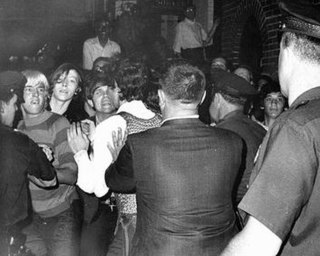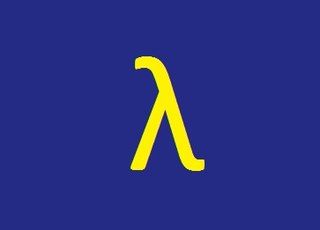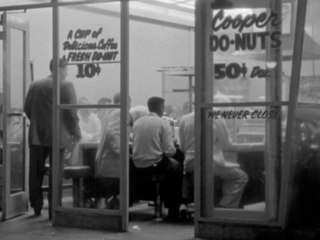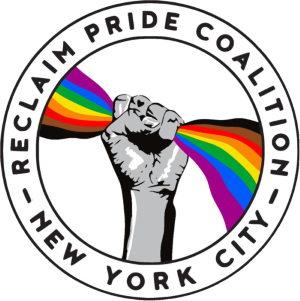
The Stonewall riots, also known as the Stonewall uprising, Stonewall rebellion, or simply Stonewall, were a series of protests by members of the LGBTQ community in response to a police raid that began in the early morning hours of June 28, 1969, at the Stonewall Inn in the Greenwich Village neighborhood of Lower Manhattan in New York City. Patrons of the Stonewall, other Village lesbian and gay bars, trans activists and unhoused LGBT individuals fought back when the police became violent. The riots are widely considered the watershed event that transformed the gay liberation movement and the twentieth-century fight for LGBT rights in the United States.
This is a list of notable events in the history of LGBT rights that took place in the year 1981.
This is a list of notable events in the history of LGBT rights that took place in the year 1970.

The Gay Activists Alliance (GAA) was founded in New York City on December 21, 1969, almost six months after the Stonewall riots, by dissident members of the Gay Liberation Front (GLF). In contrast to the Liberation Front, the Activists Alliance solely and specifically served to gay and lesbian rights, declared themself politically neutral and wanted to work within the political system.

Gay Liberation Front (GLF) was the name of several gay liberation groups, the first of which was formed in New York City in 1969, immediately after the Stonewall riots. Similar organizations also formed in the UK, Australia and Canada. The GLF provided a voice for the newly-out and newly radicalized gay community, and a meeting place for a number of activists who would go on to form other groups, such as the Gay Activists Alliance, Gay Youth New York, and Street Transvestite Action Revolutionaries (STAR) in the US. In the UK and Canada, activists also developed a platform for gay liberation and demonstrated for gay rights. Activists from both the US and UK groups would later go on to found or be active in groups including ACT UP, the Lesbian Avengers, Queer Nation, Sisters of Perpetual Indulgence, and Stonewall.

The gay liberation movement was a social and political movement of the late 1960s through the mid-1980s in the Western world, that urged lesbians and gay men to engage in radical direct action, and to counter societal shame with gay pride. In the feminist spirit of the personal being political, the most basic form of activism was an emphasis on coming out to family, friends, and colleagues, and living life as an openly lesbian or gay person.

The NYC Pride March is an annual event celebrating the LGBTQ community in New York City. The largest pride parade in North America and among the largest pride events in the world, the NYC Pride March attracts tens of thousands of participants and millions of sidewalk spectators each June. The parade route through Lower Manhattan traverses south on Fifth Avenue, through Greenwich Village, passing the Stonewall National Monument, site of the June 1969 riots that launched the modern movement for LGBTQ+ rights.
This is a list of notable events in the history of LGBT rights that took place in the 1960s.

LGBT pride is the promotion of the self-affirmation, dignity, equality, and increased visibility of lesbian, gay, bisexual, and transgender (LGBT) people as a social group. Pride, as opposed to shame and social stigma, is the predominant outlook that bolsters most LGBT rights movements. Pride has lent its name to LGBT-themed organizations, institutes, foundations, book titles, periodicals, a cable TV channel, and the Pride Library.

The Black Cat Tavern is an LGBT historic site located in the Silver Lake neighborhood of Los Angeles, California. In 1967, it was the site of one of the first demonstrations in the United States protesting police brutality against LGBT people, preceding the Stonewall riots by over two years.

Atlanta Pride, also colloquially called the Atlanta Gay Pride Festival, is a week-long annual lesbian, gay, bisexual, transgender (LGBT) pride festival held in Atlanta, Georgia. Established in 1971, it is one of the oldest and largest pride festivals in the United States. According to the Atlanta Pride Committee, as of 2017, attendance had continually grown to around 300,000. Originally a pride held in June, Atlanta Pride has been held in October every year since 2008, typically on a weekend closest to National Coming Out Day.
The Annual Reminders were a series of early pickets organized by gay organizations, held yearly from 1965 through 1969. The Reminder took place each July 4 at Independence Hall in Philadelphia and were among the earliest LGBT demonstrations in the United States. The events were designed to inform and remind the American people that gay people did not enjoy basic civil rights protections.

Stonewall Uprising is a 2010 American documentary film examining the events surrounding the Stonewall riots that began during the early hours of June 28, 1969. Stonewall Uprising made its theatrical debut on June 16, 2010, at the Film Forum in New York City. The film features interviews with 15 participants and eyewitnesses to the riots, including many who were active in the uprising and later went on to form gay liberation groups, as well as law enforcement who participated in the raids that precipitated the rebellion.
The state of Georgia mostly improved in its treatment of lesbian, gay, bisexual and transgender residents in the years after 1970, when LGBT residents began to openly establish events, organizations and outlets for fellow LGBT residents and increase in political empowerment.

New York City has been described as the gay capital of the world and the central node of the LGBTQ+ sociopolitical ecosystem, and is home to one of the world's largest LGBTQ populations and the most prominent. Brian Silverman, the author of Frommer's New York City from $90 a Day, wrote the city has "one of the world's largest, loudest, and most powerful LGBT communities", and "Gay and lesbian culture is as much a part of New York's basic identity as yellow cabs, high-rise buildings, and Broadway theatre". LGBT travel guide Queer in the World states, "The fabulosity of Gay New York is unrivaled on Earth, and queer culture seeps into every corner of its five boroughs". LGBT advocate and entertainer Madonna stated metaphorically, "Anyways, not only is New York City the best place in the world because of the queer people here. Let me tell you something, if you can make it here, then you must be queer."

The Cooper Do-nuts Riot was an alleged uprising in reaction to police harassment of LGBT people at a 24-hour donut cafe in Los Angeles in the 1960s. Whether the riot actually happened, the date, location and whether or not the cafe was a branch of the Cooper chain are all disputed, and there is a lack of contemporary documentary evidence, with the Los Angeles Police Department (LAPD) stating that any records of such event would have been purged years ago.

Reclaim Pride Coalition is a coalition of LGBT groups and individuals that initially gathered in New York City in 2019 to create the Queer Liberation March in honor of the 50th Anniversary of the Stonewall riots and to protest the commercialization of LGBT Pride events. The following year, in solidarity with Black Lives Matter, the coalition organized the Queer Liberation March for Black Lives & Against Police Brutality.
The Atlanta Eagle police raid was a police raid targeting the Atlanta Eagle, a gay bar in Atlanta, Georgia, United States. The raid occurred on September 10, 2009, due to anonymous tips alleging that illegal drug use and sex was occurring at the bar. Several dozen officers were involved in the raid, including members of the Atlanta Police Department's vice squad and the "Red Dog Unit", a SWAT-like unit typically used in high drug use areas. None of the 62 bar patrons that night were arrested, although eight employees were. Seven of these employees were either found not guilty or had charges dropped against them, while one was not present at the trials and had a bench warrant issued against him.
Queer radicalism can be defined as actions taken by queer groups which contribute to a change in laws and/or social norms. The key difference between queer radicalism and queer activism is that radicalism is often disruptive, and commonly involves illegal action. Due to the nature of LGBTQ+ laws around the world, almost all queer activism that took place before the decriminalization of gay marriage can be considered radical action. The history of queer radicalism can be expressed through the many organizations and protests that contributed to a common cause of improving the rights and social acceptance of the LGBTQ+ community.









